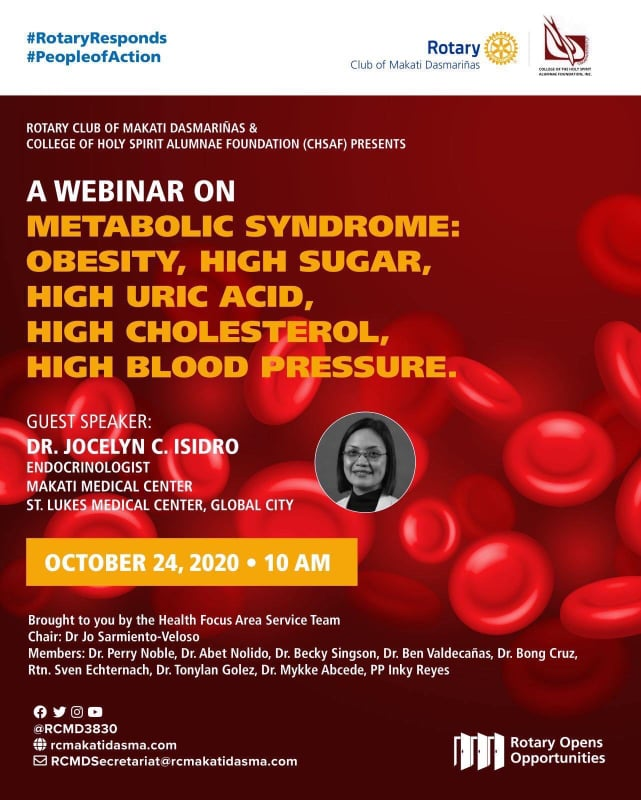The College of the Holy Spirit Alumnae Foundation in cooperation with the Rotary Club of Makati Dasmarinas held a health webinar on Metabolic Syndrome on October 24, 2020. Our guest speaker was Dr. Maria Jocelyn C. Isidro, an endocrinologist at the Makati Medical Center and St. Luke’s Medical Center, BGC. Dr. Isidro is an alumna of College of the Holy Spirit, magna cum laude, B.S. Biology Class of 1994.
Eighty-four CHS alumnae signed up for the webinar as they were all eager to learn about metabolic syndrome and its complications. We learned from our speaker that these complications are type 2 diabetes, hypertension, cardiovascular diseases, cerebrovascular diseases and obstructive sleep apnea. We also learned about what can we do to prevent these problems. We need lifestyle modifications such as weight reduction by 5-10 percent of body weight through caloric restriction and increased physical activity or exercise for 30-60 minutes daily. We should also stop smoking and start eating fiber-rich foods because “an ounce of prevention is worth a pound of cure,” according to Benjamin Franklin. Of course, this is easier said than done. We’ve all heard this before putting it into practice is a different story.
According to the World Health Organization, in 2014 cardiovascular disease accounted for 33 percent of deaths in the Philippines. In 2016, cardiovascular disease was considered the number one cause of death globally. And what are the causes of cardiovascular disease? High blood pressure, smoking, high cholesterol, diabetes, family history of cardiovascular disease and obesity.
For the management of obesity, the following are recommended:
1) Step therapy which includes the energy deficit meal plan, increased physical activity, behavioral modification, circadian rhythm entrainment, medical management of obesity and surgery.
2) Therapeutic lifestyle change combined with any treatment modality.
Nutritional therapy can be done through restricted dietary carbohydrate, restricted dietary fat or very low-calorie diets. There are many versions of the energy deficit meal plan i.e., keto, paleo, South Beach, vegetarian, vegan, Mediterranean, raw, low-carb and no-sugar diets. However, it is worth remembering the 15 most nutrient-dense foods on Earth. These are grass-fed liver, shellfish, salmon, eggs, kale, seaweed, cacao, avocado, sardines, shitake mushrooms, spinach, almonds, grass-fed beef, bok choy, and tomatoes.
By increasing our physical activity, we can improve the following health parameters: metabolic, musculoskeletal, cardiovascular, pulmonary, mental and sexual health. This will also assist us with weight maintenance, weight loss and will improve body composition. Exercise is also good for the heart because it lowers the following: insulin resistance, LDL cholesterol, weight, hypercoagulability, and atherosclerosis. At the same time, it increases the following: HDL cholesterol, skeletal muscle glycogen transport and the rate and amount of fat oxidation at rest.
So, in order to prevent obesity and control the body’s levels of blood sugar, blood pressure, cholesterol and uric acid, we have two choices: live a healthy lifestyle by eating the proper food nutrients with a balanced diet and exercising regularly, or take medicines as our food.
 |
 |
Left, guest speaker Dr. Maria Jocelyn C. Isidro (BS Bio-94) is an endocrinologist at Makati Medical Center. Right and below, attendees learn about metabolic syndrome and its complications.



